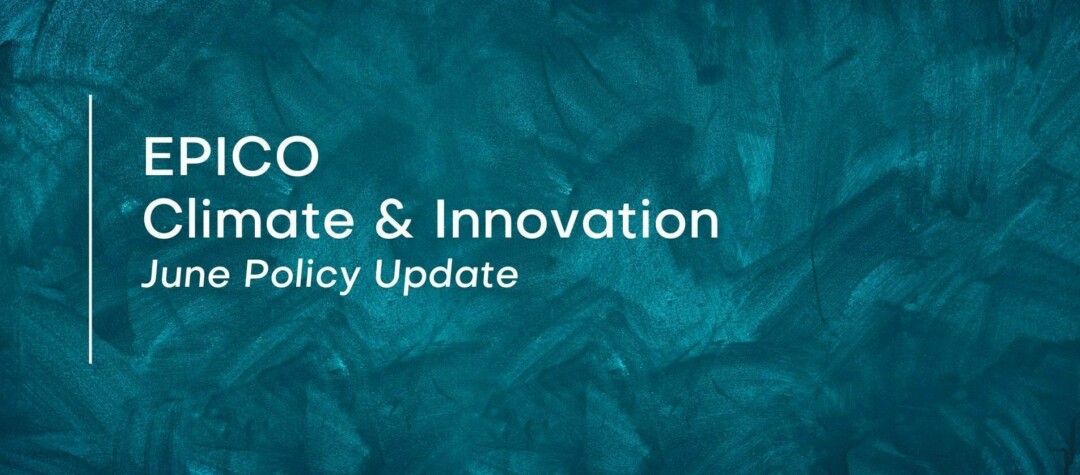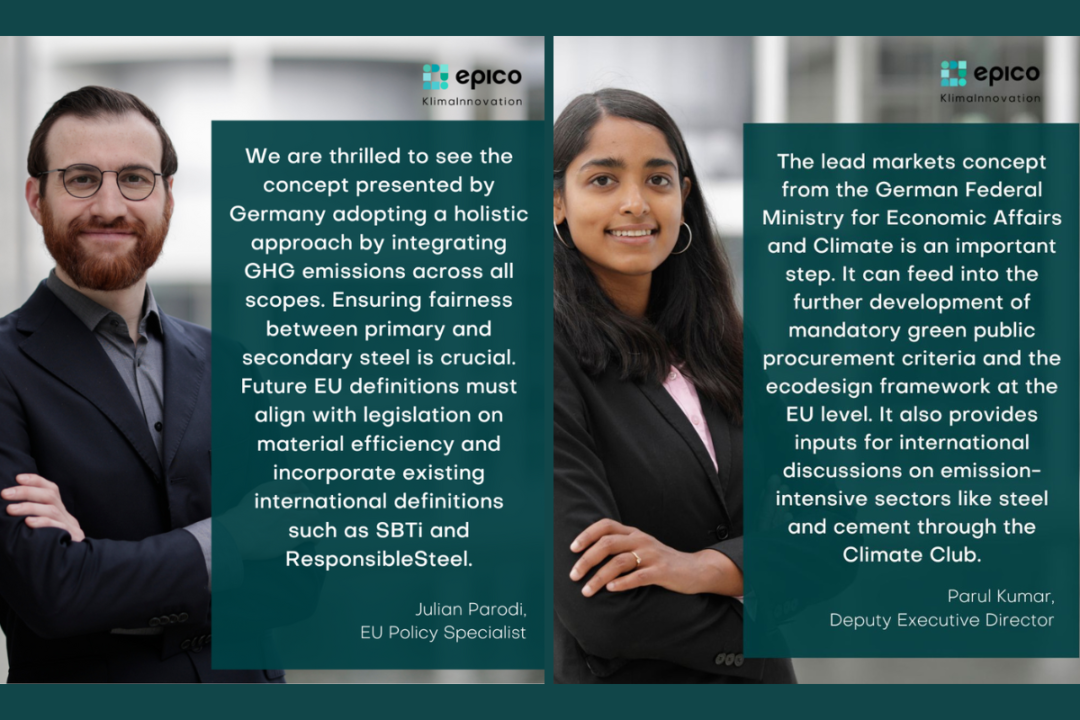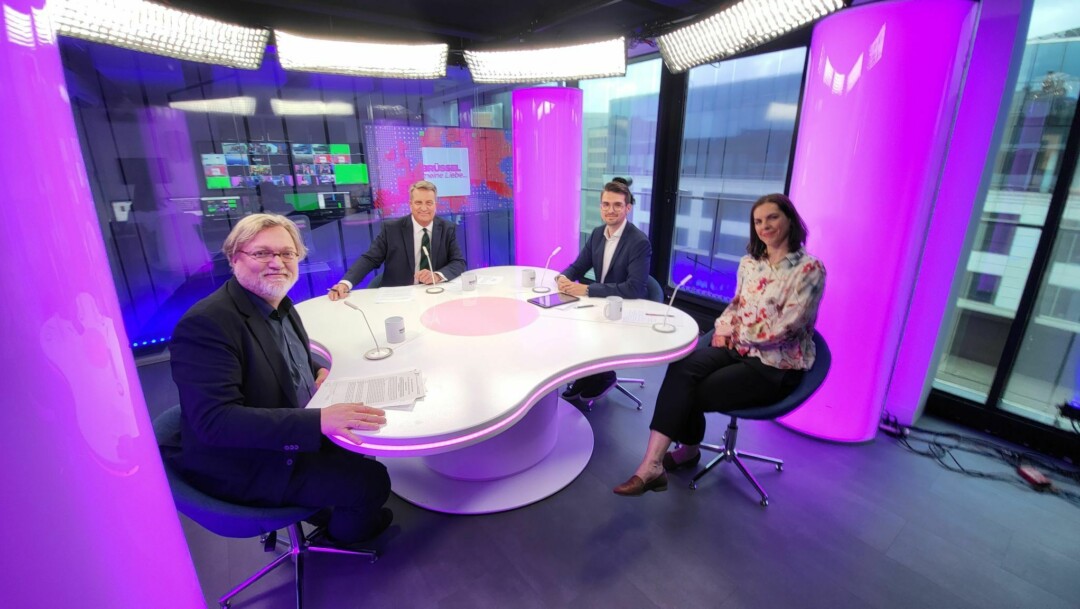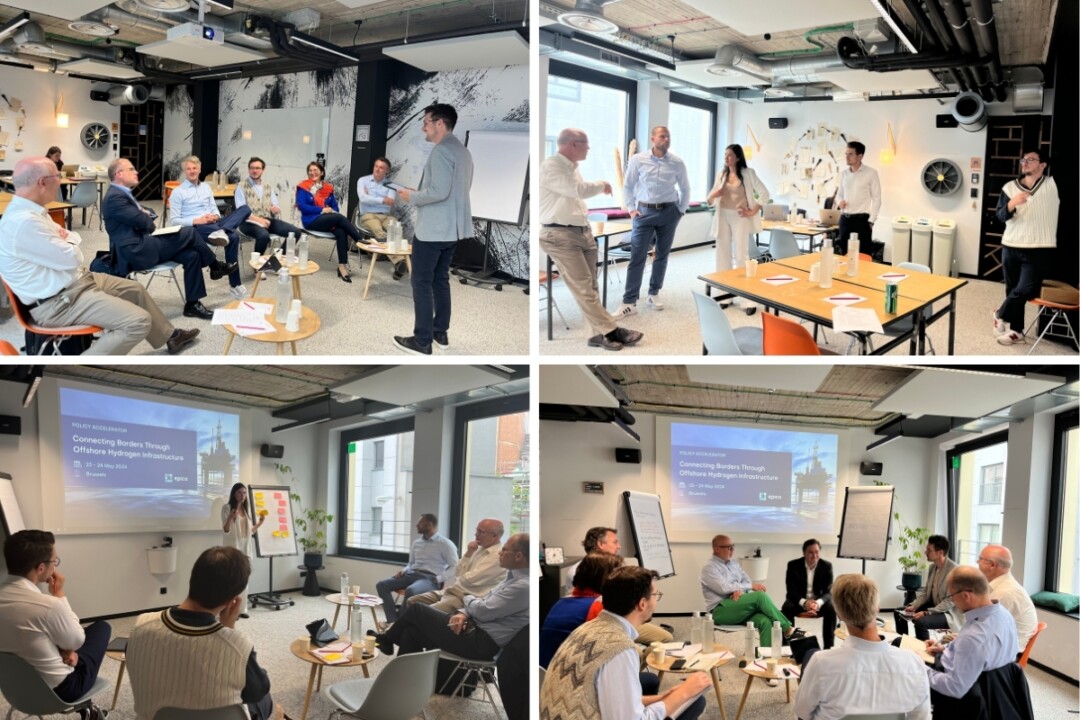
Time to set an agenda: European elections, industrial futures, and offshore strategies
EPICO KlimaInnovation is a non-profit and independent energy and climate policy think tank providing a platform and network for policy development. In our Monthly Policy Update, we dive into the latest and most relevant developments in energy and climate policy and share the outcomes of our events and publications.
The polls are open: What lies ahead for the Green Deal?
The European Summer kicks off with the EU Elections. Citizens from 27 Member States will cast their votes, shaping the European Parliament, and welcoming a new wave of MEPs – and Commissioners – to Brussels. Yet, this year’s elections bring an added layer of uncertainty as the new legislative cycle might be characterised by greater polarisation when it comes to the EU’s ‘hot topics’, including security, defence, migration, and climate.
Five years ago, in 2019, the European elections brought Ursula von der Leyen to the head of the European Commission. With an agenda that had a clear focus on improving Europe’s climate legislation and driving towards climate neutrality, von der Leyen quickly supported the formalisation of the European Green Deal in 2019 and the adoption of the European Climate Law in 2021, setting Europe’s net-zero target by 2050.
Now, as citizens prepare to vote again, the future of the European Green Deal hangs in the balance. The rise of climate-adverse far-right parties threatens to undermine public support for Europe’s quest to net-zero. Meanwhile, the numerous farmers’ protests in Brussels and other EU capitals have forced the Commission to backtrack in some of the Green Deal’s policies, creating new exemptions for land management rules and other regulatory requirements. Adding to the complexity is an increasingly volatile geopolitical scenario, marked by Russia’s war in Ukraine, tensions in the Middle East (Israeli, Palestine, Yemen), and the looming possibility of a Trump return. These pressures are shifting policymakers’ focus predominantly to security and defence, leaving climate and energy policy in the back seat.
As Europe faces these uncertainties, it is fair to ask whether the Green Deal can still be considered “Europe’s man on the moon moment” and whether its future implementation can be guaranteed. Responding to these questions, on 23 May, EPICO’s CEO Bernd Weber participated in the German edition of Euronews’ talk show “Brussels, my love?”, alongside Patrick ten Brink (EEB), Julia Hildermeier (RAP), and Stefan Grobe (Euronews).
In the show, Bernd argued that the EU needs to be forward-looking in its discussion about the Green Deal, complementing this strategy with a sociologically and ecologically sound market agenda. The new legislative cycle provides an opportunity to focus on implementation. Yet, this must become a project driven by engineers, entrepreneurs, and start-ups, and it must valorise Europe’s most important asset: the European Single Market.
Get ready for the elections! WATCH the Euronews show here.
EPICO’s EU Policy Specialist, Julian Parodi, was also asked by Alexandra Warren (ENDS Europe) to give his views on the future of Europe’s climate policies after the European elections. Will a shift to the right significantly change the EU’s strategy towards net-zero?
READ Julian’s response here.
A competitive future for European industries: Counting down to Draghi’s report
Alongside the elections, excitement in Brussels is also brewing for the publication of Mario Draghi’s Competitiveness Report. Tasked by the Commission to define the priorities for Europe’s competitiveness, Draghi’s report is expected to call for “radical change”, taking a closer look at the green, digital and security sectors.
Coupled with the previous report by Enrico Letta on the future of Europe’s Single Market and the upcoming EU strategic agenda for 2024 – 2029, Draghi’s insights will play a crucial role in determining the future of the EU’s economic agenda. The report, set to be published at the end of the month, will provide actionable measures to improve the scalability of Europe’s industries, boost investments, and strengthen the Capital Markets Union, promising to be a game-changer for EU competitiveness.
EPICO shares the sense of urgency expressed by Draghi and other leaders about the need for a competitive and resilient industrial compass. Already in April, we published a paper outlining our key priorities for a new European and German industrial agenda, emphasising the need for innovation and the scaling up of clean tech manufacturing.
Joining the debate on Europe’s future competitiveness, EPICO’s esteemed Advisory Board, composed of policymakers, industry leaders, representatives from civil society organisations, and academics, will publish a policy paper on Europe’s industrial and energy strategy, which will provide a compass for the next legislative cycle.
Highlighting the notion of European resilience, the paper will provide 7 recommendations on how to strengthen our economic and energy sectors without limiting our thinking to short-sighted, isolationist strategic autonomy approaches. Instead, EPICO’s Advisory Board will propose a new holistic framework, which focuses on strengthening the internal market, accelerating energy infrastructure, increasing global cooperation, structuring the hydrogen uptake, and rethinking Europe’s supply chains.
What should we expect from this paper? Read EPICO’s Bernd Weber’s insight:
The EU must rethink its energy and climate policy to meet its goals, leveraging the new legislative cycle to build on the successes of the European Green Deal, with a focus on implementation, competitiveness, and growth. EPICO’s forthcoming paper authored by our Advisory Board provides a clear and holistic compass for the next EU cycle.
Don’t miss it! The Advisory Board paper will soon be published on our website.
REGISTER for our mailing list to receive our publication alerts.
A particular focus of Draghi’s report will be on energy-intensive sectors, like steel and cement, whose competitiveness at the global level is hampered by asymmetries in terms of subsidies, regulation, and trade policies. Leading up to this, at the end of May, German Federal Minister for Economic Affairs Robert Habeck presented a concept for the development of green lead markets for low-emission steel, introducing the so-called Low-Emission Steel Standard (LESS). This groundbreaking initiative marks a significant milestone in one of the world's largest steel-producing countries. By pioneering LESS, Germany is taking a key step towards climate neutrality and paving the way towards further development of green public procurement.
EPICO welcomes the concept and hopes it can serve as an input for future discussions on supporting intensive sectors’ decarbonisation. EPICO’s Deputy Executive Director, Parul Kumar, and EU Policy Specialist, Julian Parodi, posted their reactions to the lead markets announcement last week.
READ it below and SHARE it on LinkedIn and X.

STAY TUNED! EPICO’s work on steel decarbonisation continues. This Autumn, we will publish Europe’s steel agenda with recommendations for the new Commission.
Charting new waters: Accelerating offshore hydrogen infrastructure
The imperative to decarbonise energy-intensive sectors is intricately tied to the necessity of expanding clean energy production, with a particular emphasis on hydrogen. In late April, the results of the first European Hydrogen Bank auction were announced, marking another milestone in Europe’s quest for renewable energy sources. Seven projects across the EU will receive a total of €720 million, with a plan to produce 1.58 million tonnes (Mt) of renewable hydrogen over ten years. The funds come from the revenue of the Emission Trading System (ETS).
Scaling up clean energy production has also been central to national agendas. On 14 May, national hydrogen associations from all over Europe met in Rotterdam to sign a Cooperation Charter for European Associations Advancing Clean Hydrogen, which will guide the joint efforts to establish favourable conditions for hydrogen technologies.
Despite the uncertainties surrounding the future of Europe’s climate policies, hydrogen seems to stand firmly on the EU’s agenda. In particular, the rapid expansion of offshore wind production capacity in the North Sea is destined to boost green hydrogen production, which will play a key role in the region and unlock the potential of Europe’s new “Energy Powerhouse”.
On 23 and 24 May, EPICO hosted two Policy Accelerators on this topic, respectively focusing on “Accelerating Regional Cooperation on Infrastructure Development” and “Accelerating Infrastructure Financing” in the North Sea.
With two teams of experts, including Piotr Kus (ENTSO-G), Jakop Dalunde MEP (Greens/EFA, Sweden), Christian Hewicker (DNV), Isabel Alcalde (Hydrogen Europe), Kim Lakeit (DENA), Gordon Thomas (Gascade), Matthias Janssen(Frontiers Economics), Alex Barnes (OIES), Matthias Maiwald (Gascade), Shaghayegh Smousavi (CMS), Klaus Hachmeier (CIP), Daan Geerdink (DNV), and Sam Williams (EPICO), the workshops focused on finding solutions to boost offshore hydrogen infrastructure in the North Sea through regional cooperation and innovative financing models. The discussions were moderated by EPICO’s CEO Dr Bernd Weber.
EU Policy Manager, Sam Williams, shares his key takeaway:
The EU should enhance regional cooperation, harmonise permitting processes, and establish clear infrastructure usage rules to develop offshore hydrogen infrastructure in the North Sea. We need stronger governmental commitments, particularly through the roll-out of Carbon Contracts for Difference, the incentivisation of hydrogen production, and the promotion of strategic partnerships."
WATCH this space! Building on the ideas developed during the workshops, EPICO will publish a policy brief suggesting concrete measures to boost offshore hydrogen in the North Sea.
Can’t wait? READ about our Policy Accelerator here.
As Europe continues to regulate a nascent hydrogen economy, on 28 May EPICO’s EU Policy Specialist, Julian Parodi, participated in a webinar organised by the Security and Sustainability Forum and the Club Climate Europe, where he took stock of the Hydrogen and Gas Package, the Hydrogen Bank’s auction results, and looked at the way ahead for a European hydrogen economy. Julian presented Germany's strategy, detailing the path taken and how the switch to hydrogen will be financed.
You’re still on time! WATCH the event’s recording here.
EPICO is growing!
We are looking for two talented colleagues to join our teams in Brussels and Berlin:
- Policy Specialist - Sustainable Agriculture and Food Systems (Full-time position in Berlin)
- Communications Consultant (Freelance position in Brussels)


